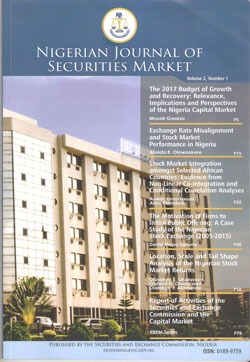
The 2017 Budget of Growth and Recovery: Relevance, Implications and Perspectives of the Nigerian Capital Market – Mounir Gwarzo
After the submission of the 2017 proposed budget by the Executive arm of Government to the National Assembly for ratification, the Securities and Exchange Commission organized a seminar on the budget. The seminar brought together major stakeholders in the capital market who brainstormed on a range of issues concerning the budget, including its relevance, implications and perspectives of the capital market. In line with prevailing theory, this paper underscores the need for fiscal expansion in times of recession, but argues for concerted efforts to reduce budget deficits especially as the economy begins to emerge from recession and the growth momentum gathers pace.
Exchange Rate Misalignment and Stock Market Performance in Nigeria – Afolabi E.Olowookere
Exchange rate as a key macroeconomic variable can have serious implications on economic behaviour when the rate is seen to deviate from its equilibrium value. Companies and investors with foreign exchange exposure often experience unexpected costs from exchange rate misalignment and this can hamper stock prices. This paper contributes to the literature on the extent to which such misalignment affects the performance of stock markets. Based on the Flow- and Stock-oriented models, the paper applies the Vector Error Correction Model to Nigerian monthly data between January, 2000 and March, 2017. Results show that exchange rate misalignment, measured as the difference between parallel market and official exchange rates, dampens the growth of the Nigerian stock market. The paper therefore underscores the importance of exchange rate to the country’s stock market and offers policy advice towards strengthening the current efforts at solving Nigeria’s exchange rate misalignment and foreign exchange challenges.
Stock Market Integration amongst Selected African Countries: Evidence from Non-Linear Co-integration and Conditional Correlation Analyses. – Umar Auwal, Aliyu Rafindadi Sanusi
Previous studies show that the heterogeneity of African Stock Markets (ASMs) makes integration difficult. This paper investigates this claim by applying a two-step procedure. The study applies the Breitung’s Rank test for nonlinear cointegration to a monthly data (2004:02 to 2015:09) to determine the tendency for long-run price convergence in the selected markets. In the second step, the study then applies the MGARCH models to a daily dataset (May 2, 2007, to November 30, 2015) to evaluate the volatility spillover in returns amongst the selected markets. The results reveal some evidence of integration amongst the markets. Specifically, it was found that activities in the South African market tend to significantly affect the Egyptian and Nigerian markets. The study concludes that notwithstanding the general impression, some stock markets in Africa are fairly integrated with spillover effects nonlinearly transmitted.
The Motivation of Firms to Initial Public Offering: A Case Study of the Nigerian Stock Exchange (2005 – 2015)- David Mopa Egbunu
The central aim of the present study is to investigate the motivation of firms to initial public offering (IPO) with a view to testing in the Nigerian capital market context, the existence of key IPO motivations espoused in previous studies. The paper also seeks to measure the extent to which IPO motivation is endogenously driven (that is, motivated by factors internal to firms) or motivated by external factors. All 26 IPO firms were used to test for the exogenous motivations while 22 for which data was available were used to test for endogenous motivation. Based on descriptive and regression analysis, the results confirm the existence of 6 key endogenous IPO motivations, with the investment-funding and cost of capital motive being the strongest endogenous factors. The results obtained also indicate that the number of IPOs is not significantly affected by capital market and macroeconomic performance. In view of the rather short sample over which the study was conducted, these results are tentative, calling for further research whenever additional IPO data becomes available.
Location, Scale and Tail Shape Analysis of the Nigerian Stock Market Returns- Olusanya E. Olubusoye, Olufemi D.Olusoji, Olalekan J.Akintande
The central aim of the present study is to investigate the motivation of firms to initial public offering (IPO) with a view to testing in the Nigerian capital market context, the existence of key IPO motivations espoused in previous studies. The paper also seeks to measure the extent to which IPO motivation is endogenously driven (that is, motivated by factors internal to firms) or motivated by external factors. All 26 IPO firms were used to test for the exogenous motivations while 22 for which data was available were used to test for endogenous motivation. Based on descriptive and regression analysis, the results confirm the existence of 6 key endogenous IPO motivations, with the investment-funding and cost of capital motive being the strongest endogenous factors. The results obtained also indicate that the number of IPOs is not significantly affected by capital market and macroeconomic performance. In view of the rather short sample over which the study was conducted, these results are tentative, calling for further research whenever additional IPO data becomes available.
Report of activities of the Securities and Exchange Commission and the Capital Market -Economic Research and Policiy Management (ERPM) Team
Report of activities of the Securities and Exchange Commission and the Capital Market
